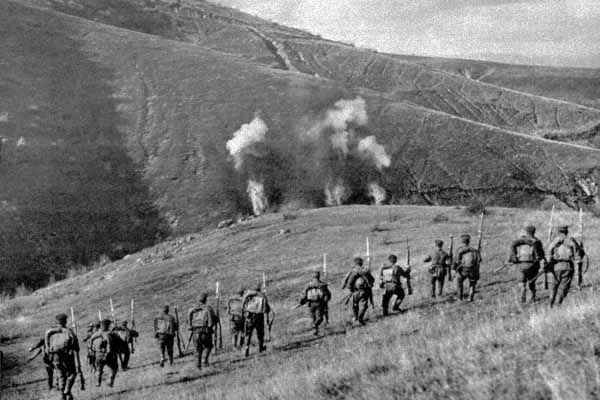A hundred years after it roared into life with the rumbling of German troops into Belgium, the cataclysm we now call World War I still reverberates through the nooks and crannies of modern life. Its effects can be seen most dramatically in the Middle East, where it resulted in the arbitrary drawing of national borders by Europeans – lines in the sand the militant Sunni group ISIL, the Islamic State of Iraq and the Levant, now seeks to erase. In Russia, it helped give rise to the 1917 Bolshevik revolution and by extension the Soviet Union, whose stultifying economic effects are still felt in parts of Eastern Europe. Its whispers are heard in the way we now commemorate death – in the silence kept on Armistice Day and observed where the World Trade Center towers once stood. It is present in our well-groomed cemeteries, with their idea of death as but a peaceful slumber in an area disturbed by little more than birdsong and the rustle of leaves. And yet, for all that, historians have trouble agreeing on when the war actually started, whether it was avoidable, and even what caused it. The march toward war had begun more than five weeks before the German invasion of Belgium. As diplomats fumbled and generals strategized, the goose stepping toward catastrophe took on a life of its own.
The spark that lit the gas-filled chamber that was Europe was the assassination in Sarajevo of Archduke Franz Ferdinand, heir apparent to the Austrian throne, on June 28, 1914.
But Ferdinand was a minor figure, a historical footnote who, had he and his wife not been shot to death, would be little remembered – and would not, it seems certain, have had a rock band named after him.
A critical cause was long-simmering tension between Germany and France. France wanted to regain the territory of Alsace-Lorraine, lost to Germany in the Franco-Prussian War of 1870-71. Germany envied France her colonies – and feared so-called “encirclement” by its enemies.
The truth is that Germany and France, and to some extent Russia, had been preparing for this war for decades.
The Schlieffen plan – under which German forces would wheel through Belgium and attack Paris from the north, behind the French armies, which would be massed on the country’s eastern border – had existed in one form or another since the 1850s. That was well before its namesake, Alfred von Schlieffen, took over as chief of the Imperial German General Staff.
France, too, had been working for decades on plans for war with Germany, planning to burst through their joint border and make a bee-line for Berlin.
Was the war the accidental, backed into by “sleepwalkers,” as some historians contend? Or was it about German expansionism, the country’s yearning for pre-eminence in Europe? Or was it caused by the automaticity of a series of treaties: If Serbia was attacked, in this case by Austria in retaliation for the archduke’s assassination, Russia would defend her.
And if Russia, then France; and if Austria, then Germany; and if Belgium, then England – the treaties seemed like a series of falling dominoes that no one could stop.
But the domino theory is not fully correct, said David Stevenson, chairman of the Department of International History at the London School of Economics.
The Austria-Germany agreement was a defensive alliance, and Austria had not been attacked. The Germans, in giving a so-called “blank check” to Austria, “went above and beyond what was required by the alliance,” Stevenson said.
The Russian-French alliance, too, was defensive, requiring Russia to consult before mobilizing – something it did not do. So France was not required to honor the treaty.
And Britain’s agreement to respect Belgian neutrality didn’t actually require Britain to take any specific action.
“The alliance commitments in 1914 were not automatic,” Stevenson said. “But of course everybody operated under the assumption that there would be a general war.”
And that assumption became reality.
In the days before the German invasion of Belgium, there had been declarations of war: Austria-Hungary against Serbia, Germany against Russia, and Germany against France.
But many say the war started 100 years ago Monday, on Aug. 4, 1914, when Germany invaded Belgium, prompting England, which had pledged to honor Belgian neutrality, to declare war on Germany that same day.
“If the iron dice must roll,” German chancellor Theobald von Bethmann-Hollweg had said three days earlier, “may God help us.”
Now they had been rolled.
With Britain officially in the war, and German troops determined to punch through to French territory and push on to Paris, there was no turning back.
By the time the war ended, more than four years later, 10 million people would be dead. The 19th Century would be truly over and the 20th Century – the bloodiest in human history – truly begun.
A cataclysm would consume Europe, leaving two empires – the Austro-Hungarian and the Ottoman – in ruins. A third, the British, would go into quick decline.
There would be little use of the cavalry, men charging across open terrain on horseback, rifles and bayonets at the ready.
Instead, the technology that had seemed so marvelous in the 19th and early 20th Centuries – which gave us the dams and levees, the transcontinental railway, the Eiffel Tower, the automobile and the airplane, the miracle of mass-production – much of the technological knowhow that had once seemed evidence of progress would now be turned now toward killing.
The Great War, as it was then called, saw the first use of flamethrowers, the first widespread use of machine guns, the first use of chemical weapons, the first use of tanks and the first military use of airplanes.
Even the invention of canned meat was a factor: Armies could now be more easily fed in winter.
This would be a war like none that had gone before. Men stuck in trenches that stretched from the North Sea to the German Border would fight and die in their tens of thousands in what became a war of attrition – whoever had any men left at the end would be the winner.
Soldiers, sometimes fortified by rum, would follow orders to “go over the top” – leave their trenches and rush toward the enemy, trying to cut through barbed wire that blocked their path. Along the way they were cut down in their thousands by machine-gun fire.
Soldiers fought and died for months and years for gains of little more than a kilometer or two. On the first day of the Battle of the Somme in France – July 1, 1916 – Britain suffered 58,000 casualties; a third of those young men died.
It remains the deadliest single day in British military history.
Among the British troops who fought at the Somme was a 24-year-old battalion signaling officer named J.R.R. Tolkien. The horror of those battles is echoed in those depicted in his fantasy trilogy, “The Lord of the Rings,” written 20 to 30 years later.
Among the Germans at the Somme was 29-year-old Lance Corporal Adolf Hitler. Hitler was wounded in the groin and evacuated to Germany. There he decided Jews were undermining the country by leading the peace movement. This buttressed his already strong anti-Semitism.
It was not only Europeans who fought and died. In the ill-fated Dardanelles campaign of 1915 and 1916, Britain and its allies sent hundreds of thousands of men – many of them from Australia and New Zealand – to attack the peninsula on the northern side of the straits that lead to the Black Sea.
The campaign was a disaster for the allies, a great loss of life with no result. In all, the allies had about 56,000 men killed; the Ottomans lost a similar number. But the Ottomans held their ground under the leadership of Mustafa Kemal, who later built the Turkish Republic amid the ruins of the Ottoman Empire, and was given the title Ataturk – father of the Turks.
The war would leave much of Europe in ruins. The fertile fields of northern France still yield up bodies and armaments to this day.
The Great War would develop into a grim war of attrition: Whoever still had men left at the end would be the winner. With both sides near exhaustion, the entry of the United States – which, by the summer of 1918 was sending 10,000 soldiers a day to France – would prove decisive.
Germany could carry on no longer and submitted – agreeing to terms at Versailles that some on both sides of the conflict would find too harsh, Hitler among them.
Beyond that, the map of the Middle was redrawn by two Europeans, the Briton Mark Sykes and the Frenchman Francois Georges-Picot, who showed scant regard for the wishes of the people who lived there, with repercussions that remain violent to this day.
The war also wrought important cultural changes, said Martin Hurcombe, a senior lecturer in the French Department at the University of Bristol, in Britain.
Rationalism, which was perceived as having led to the war, went into decline, he said. The study of the subconscious emerged.
There was a sense, Hurcombe said, that the rules had collapsed. Avant-garde art hit the mainstream.
Pacifism and the drive for women’s rights gained momentum, he said. Both causes were embodied in Vera Brittain, a British war nurse who became a tireless campaign, and whose memoir, “Testament of Youth,” became a best-seller.
The guns that roared into life in August 100 years ago did not fall silent for more than four years, not until an armistice came into effect at the 11th hour of the 11th day of the 11th month, a time chosen by people who believed they had just ended the war to end all wars.
But the armistice came one minute too late for Pvt. Henry Gunther, an American who had been busted from sergeant down to private for writing a letter home complaining about “miserable conditions.”
Gunther’s unit was still involved in combat on the morning of Nov. 11. The Armistice has been signed at 5 a.m. but would not take effect until 11:00 a.m.
Gunther's unit approached a roadblock of two German machine guns in Lorraine.
Gunther, who had brooded about his demotion and wanted to make good, rose up against orders and charged the machine guns with his bayonet. The Germans, who knew the armistice was about to take effect, tried to wave him off.
But when he got too close they opened fire, killing him. The time was 10:59 a.m.
The Great War turned out not to have been the war to end all wars. It merely set the stage for an even greater cataclysm -- World War II, in which not 10 million but 50 million people would lose their lives.
And it is a repetition of World War II that the European Union and the UN, with their endless summits and sometimes meaningless gabfests, are designed to prevent.
But with what long-term success, we cannot yet know.


 Prime Minister Keir Starmer's 2025 Easter message
Prime Minister Keir Starmer's 2025 Easter message After Nesil Caliskan a by-election will be held in Jubilee ward in Enfield
After Nesil Caliskan a by-election will be held in Jubilee ward in Enfield Publishing the analysis, Labour’s Cllr Ergin Erbil said Everybody in Enfield deserves basic rights
Publishing the analysis, Labour’s Cllr Ergin Erbil said Everybody in Enfield deserves basic rights Gaza-Israel conflict Statement from Cllr Ergin Erbil, Leader of Enfield Council
Gaza-Israel conflict Statement from Cllr Ergin Erbil, Leader of Enfield Council UK AMBASSADOR TO TURKEY VISITS FETHIYE
UK AMBASSADOR TO TURKEY VISITS FETHIYE Journalists from Europe held the Turkish Media Workshop in Skopje
Journalists from Europe held the Turkish Media Workshop in Skopje The European Union called on Turkey to uphold democratic values
The European Union called on Turkey to uphold democratic values Turkish citizens in London said Rights, Law, Justice
Turkish citizens in London said Rights, Law, Justice The 'Prince of Paris' has impressed in his first EuroLeague season
The 'Prince of Paris' has impressed in his first EuroLeague season Saran Media And Euroleague Basketball Extend Media Rights Partnership for Four More Years
Saran Media And Euroleague Basketball Extend Media Rights Partnership for Four More Years Will Rangers be Jose Mourinho’s next victim?
Will Rangers be Jose Mourinho’s next victim? Jose Mourinho's Fenerbahce face Rangers on Thursday
Jose Mourinho's Fenerbahce face Rangers on Thursday Residents welcomed back to Edmonton Leisure Centre
Residents welcomed back to Edmonton Leisure Centre Barclays has become the biggest UK lender so far to cut mortgage rates
Barclays has become the biggest UK lender so far to cut mortgage rates THE SPRING STATEMENT EXPLAINED, UK ECONOMIC OUTLOOK AND GROWTH FORECASTS
THE SPRING STATEMENT EXPLAINED, UK ECONOMIC OUTLOOK AND GROWTH FORECASTS Launch of Made in Enfield gift shop to celebrate local artists and designers
Launch of Made in Enfield gift shop to celebrate local artists and designers
















